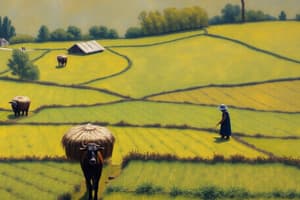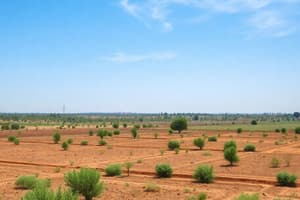Podcast
Questions and Answers
The conversion of ______ cultivation to continuous annual cropping systems brings about substantial losses of time-averaged aboveground carbon stocks.
The conversion of ______ cultivation to continuous annual cropping systems brings about substantial losses of time-averaged aboveground carbon stocks.
shifting
Under continuous annual cropping, the carbon stock is only ______ to 4 t/ha.
Under continuous annual cropping, the carbon stock is only ______ to 4 t/ha.
1
The ______ agroforestry systems, including traditional long fallow shifting cultivation, has a higher carbon sequestration capacity.
The ______ agroforestry systems, including traditional long fallow shifting cultivation, has a higher carbon sequestration capacity.
agroforestry
The rotational ______ system may be promoted as a viable option for development of the shifting cultivation system.
The rotational ______ system may be promoted as a viable option for development of the shifting cultivation system.
There is a lack of information on the effect of varying ______ period on the carbon stock throughout the soil profile.
There is a lack of information on the effect of varying ______ period on the carbon stock throughout the soil profile.
The transition from the long-fallow ______ cultivation to short-fallow shifting cultivation has been claimed to be unavoidable.
The transition from the long-fallow ______ cultivation to short-fallow shifting cultivation has been claimed to be unavoidable.
The carbon stock can be increased by ______ times by prolonging the cycles of 8 years.
The carbon stock can be increased by ______ times by prolonging the cycles of 8 years.
The ______ cultivation and climate change are interconnected issues.
The ______ cultivation and climate change are interconnected issues.
Maize, mustard, tobacco and other seasonal vegetables were planted in between the trees of ______, Dalbergia sissoo and Tectona grandis (Teak) and harvested the agricultural crops twice a year.
Maize, mustard, tobacco and other seasonal vegetables were planted in between the trees of ______, Dalbergia sissoo and Tectona grandis (Teak) and harvested the agricultural crops twice a year.
The essence of this system is involving landless poor local villagers as ______ planters and minimize the weeding cost.
The essence of this system is involving landless poor local villagers as ______ planters and minimize the weeding cost.
______ is mostly limited to small household's subsistence farming.
______ is mostly limited to small household's subsistence farming.
The major ______ practices include Home gardens, Agri-silviculture, Silvi-pastoral system, and Agro-Silvo-pastoral system.
The major ______ practices include Home gardens, Agri-silviculture, Silvi-pastoral system, and Agro-Silvo-pastoral system.
One of the benefits of ______ is improved year-round production of food and of useful and profitable products.
One of the benefits of ______ is improved year-round production of food and of useful and profitable products.
______ provides protection and improvement of soil and water sources.
______ provides protection and improvement of soil and water sources.
______ furnishes shade for vegetable or other crops that require or tolerate it.
______ furnishes shade for vegetable or other crops that require or tolerate it.
One of the benefits of ______ is short-term food production offsetting cost of establishment of trees.
One of the benefits of ______ is short-term food production offsetting cost of establishment of trees.
Agroforestry aims to ______ and improve the land.
Agroforestry aims to ______ and improve the land.
Agroforestry optimizes the combined production of trees, agricultural crops, and ______.
Agroforestry optimizes the combined production of trees, agricultural crops, and ______.
Agroforestry practices are ______ managed to maintain their productive and protective functions.
Agroforestry practices are ______ managed to maintain their productive and protective functions.
Agroforestry management seeks to actively manipulate the ______ and physical interactions between the tree, crop, and animal components.
Agroforestry management seeks to actively manipulate the ______ and physical interactions between the tree, crop, and animal components.
The goal of agroforestry is to enhance the production of more than one ______ component at a time.
The goal of agroforestry is to enhance the production of more than one ______ component at a time.
Agroforestry integration may be ______ or vertical, and above- or below-ground.
Agroforestry integration may be ______ or vertical, and above- or below-ground.
Agroforestry systems aim to maintain or increase ______ (of preferred commodities as well as productivity of the land).
Agroforestry systems aim to maintain or increase ______ (of preferred commodities as well as productivity of the land).
Agroforestry can improve ______.
Agroforestry can improve ______.
If we fail to change our ways, these young men and women will suffer more than we, and they and their children will be denied their fundamental right to a healthy ______ environment.
If we fail to change our ways, these young men and women will suffer more than we, and they and their children will be denied their fundamental right to a healthy ______ environment.
We must recognize that, because resources are limited, we need a ______ way of life.
We must recognize that, because resources are limited, we need a ______ way of life.
The concept of ______ agriculture has brought the concept of sustainable agriculture to the forefront.
The concept of ______ agriculture has brought the concept of sustainable agriculture to the forefront.
The interrelatedness of all the farming systems including the ______ and the family.
The interrelatedness of all the farming systems including the ______ and the family.
Sustainable Agriculture refers to a range of strategies for addressing many ______ that effect agriculture.
Sustainable Agriculture refers to a range of strategies for addressing many ______ that effect agriculture.
Furthermore, “Sustainable” implies a time dimension and the capacity of a farming system to ______ indefinitely.
Furthermore, “Sustainable” implies a time dimension and the capacity of a farming system to ______ indefinitely.
Sustainable Agriculture refers to an agricultural production and distribution system that ______ the integration of natural biological cycles and controls
Sustainable Agriculture refers to an agricultural production and distribution system that ______ the integration of natural biological cycles and controls
Sustainable Agriculture aims to ______ and renew soil fertility and the natural resource base
Sustainable Agriculture aims to ______ and renew soil fertility and the natural resource base
Sustainable Agriculture reduces the use of ______ resources and purchased production inputs
Sustainable Agriculture reduces the use of ______ resources and purchased production inputs
Sustainable Agriculture promotes ______ in family farming and farm communities
Sustainable Agriculture promotes ______ in family farming and farm communities
The main goal of Sustainable Agriculture is to ______ produce enough food and fiber and repair the damage caused by the process
The main goal of Sustainable Agriculture is to ______ produce enough food and fiber and repair the damage caused by the process
Sustainable Agriculture aims to ______ adverse impacts on health, safety, wildlife, water quality and the environment
Sustainable Agriculture aims to ______ adverse impacts on health, safety, wildlife, water quality and the environment
Flashcards are hidden until you start studying
Study Notes
Shifting Cultivation and Carbon Stocks
- Repeated shifting cultivation leads to decreased carbon stocks in aboveground biomass and coarse woody debris, as well as reduced carbon fluxes in litter.
- Conversion to continuous annual cropping systems results in substantial losses of aboveground carbon stocks, reduced soil organic carbon (SOC) stocks, and declining soil quality.
Agroforestry Systems
- Agroforestry systems, including traditional long-fallow shifting cultivation, have higher carbon sequestration capacity compared to industrial tree plantations like oil palm monocultures.
- However, short fallow periods limit the carbon sequestration capacity of agroforestry systems.
Making Shifting Cultivation Sustainable
- Under population pressure, traditional long-fallow shifting cultivation is transitioning to short-fallow shifting cultivation, leading to land degradation.
- Rotational agroforestry systems may be a viable alternative for sustainable development in mountainous areas.
Agroforestry Objectives and Criteria
- Objectives: conserve and improve land, optimize production of trees, agricultural crops, and animals.
- Criteria:
- Intentional: designed and managed as a whole unit.
- Intensive: intensively managed to maintain productive and protective functions.
- Interactive: seeks to manipulate biological and physical interactions between components.
- Integrated: combines tree, crop, and animal components into a single management unit.
Attributes of Agroforestry
- Productivity: aims to maintain or increase production and productivity.
Agroforestry Practices and Benefits
- Practices: home gardens, agri-silviculture, silvi-pastoral systems, alley cropping, horti-silviculture, and aquasilviculture.
- Benefits:
- Improved year-round production of food and products.
- Protection and improvement of soil and water sources.
- Increased efficiency in land use.
- Furnishing of shade for crops.
- Short-term food production offsetting cost of tree establishment.
- Medium and long-term production of fruits.
Sustainable Agriculture
- Definition: an agricultural production and distribution system that integrates natural biological cycles, protects and renews soil fertility, reduces nonrenewable resource use, and optimizes on-farm inputs.
- Goals: achieve sustainable food production, repair environmental damage, and promote opportunity in family farming and farm communities.
Studying That Suits You
Use AI to generate personalized quizzes and flashcards to suit your learning preferences.




